Related Research Articles

Andrew Marvell was an English metaphysical poet, satirist and politician who sat in the House of Commons at various times between 1659 and 1678. During the Commonwealth period he was a colleague and friend of John Milton. His poems range from the love-song "To His Coy Mistress", to evocations of an aristocratic country house and garden in "Upon Appleton House" and "The Garden", the political address "An Horatian Ode upon Cromwell's Return from Ireland", and the later personal and political satires "Flecknoe" and "The Character of Holland".

Alexander Pope was an English poet, translator, and satirist of the Enlightenment era who is considered one of the most prominent English poets of the early 18th century. An exponent of Augustan literature, Pope is best known for his satirical and discursive poetry including The Rape of the Lock, The Dunciad, and An Essay on Criticism, and for his translations of Homer.
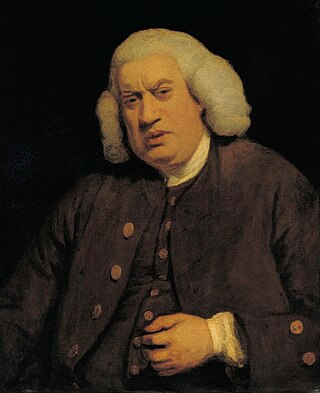
Samuel Johnson, often called Dr Johnson, was an English writer who made lasting contributions as a poet, playwright, essayist, moralist, literary critic, sermonist, biographer, editor, and lexicographer. The Oxford Dictionary of National Biography calls him "arguably the most distinguished man of letters in English history".

John Dryden was an English poet, literary critic, translator, and playwright who in 1668 was appointed England's first Poet Laureate.
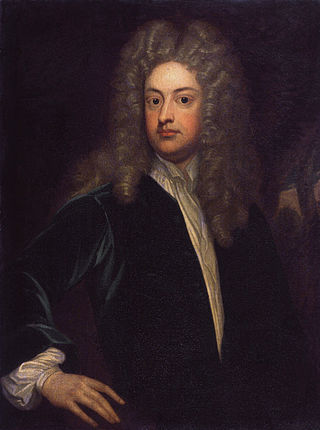
Joseph Addison was an English essayist, poet, playwright, and politician. He was the eldest son of Lancelot Addison. His name is usually remembered alongside that of his long-standing friend Richard Steele, with whom he founded The Spectator magazine. His simple prose style marked the end of the mannerisms and conventional classical images of the 17th century.

Samuel Daniel (1562–1619) was an English poet, playwright and historian in the late-Elizabethan and early-Jacobean eras. He was an innovator in a wide range of literary genres. His best-known works are the sonnet cycle Delia, the epic poem The Civil Wars Between the Houses of Lancaster and York, the dialogue in verse Musophilus, and the essay on English poetry A Defense of Rhyme. He was considered one of the preeminent authors of his time and his works had a significant influence on contemporary writers, including William Shakespeare. Daniel's writings continued to influence authors for centuries after his death, especially the Romantic poets Samuel Taylor Coleridge and William Wordsworth. C. S. Lewis called Daniel "the most interesting man of letters" whom the sixteenth century produced in England.
This article contains information about the literary events and publications of 1785.

Charles Lamb was an English essayist, poet, and antiquarian, best known for his Essays of Elia and for the children's book Tales from Shakespeare, co-authored with his sister, Mary Lamb (1764–1847).
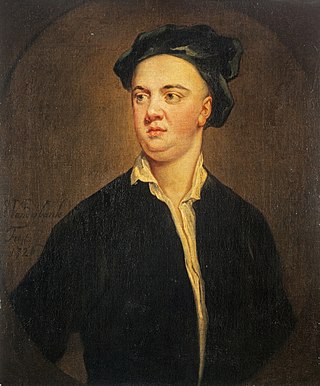
James Thomson was a Scottish poet and playwright, known for his poems The Seasons and The Castle of Indolence, and for the lyrics of "Rule, Britannia!"
Nahum Tate was an Anglo-Irish poet, hymnist and lyricist, who became Poet Laureate in 1692. Tate is best known for The History of King Lear, his 1681 adaptation of Shakespeare's King Lear, and for his libretto for Henry Purcell's opera, Dido and Aeneas.

Nicholas Rowe was an English dramatist, poet and miscellaneous writer who was appointed Poet Laureate in 1715. His plays and poems were well-received during his lifetime, with one of his translations described as one of the greatest productions in English poetry. He was also considered the first editor of the works of William Shakespeare.

Sir Richard Blackmore, English poet and physician, is remembered primarily as the object of satire and as an epic poet, but he was also a respected medical doctor and theologian.
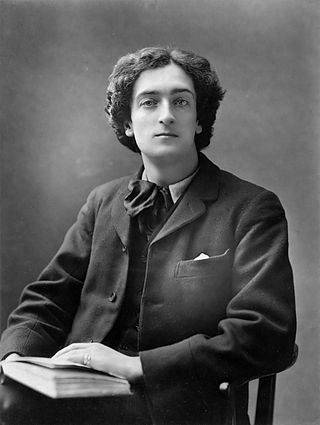
Richard Le Gallienne was an English author and poet. The British-American actress Eva Le Gallienne (1899–1991) was his daughter by his second marriage to Danish journalist Julie Nørregaard (1863–1942).

Samuel Johnson (1649–1703) was an English clergyman and political writer, sometimes called "the Whig Johnson" to distinguish him from the author and lexicographer of the same name, who was a Tory in politics and lived after him. He is one of the best known pamphlet writers who developed Whig resistance theory.
John Norris, sometimes called John Norris of Bemerton (1657–1712), was an English theologian, philosopher and poet associated with the Cambridge Platonists.
Nationality words link to articles with information on the nation's poetry or literature.
Nationality words link to articles with information on the nation's poetry or literature.
Edward Howard was an English dramatist and author of the Restoration era. He was the fifth son of Thomas Howard, 1st Earl of Berkshire, and one of four playwriting brothers: Sir Robert Howard, Colonel Henry Howard, and James Howard were the others. The brothers were sometimes confused in their own era, and Edward was sometimes given credit for his brother Henry's play The United Kingdoms.

William King was an English academic and writer, Principal of St Mary Hall, Oxford from 1719, He was known for strongly held Jacobite views, and as a satirist and poet.
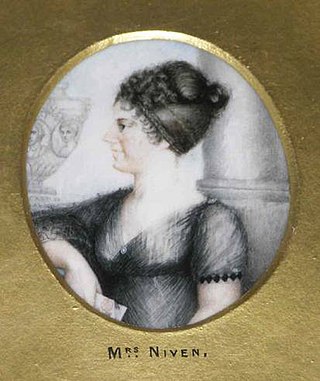
Anna Jane Vardill became Anna Niven and wrote as "V" was a British poet. She created a mystery when she published a sequel to one of Coleridge's poems before he had published his work. It was claimed that Vardill's poem was not hers but later evidence discovered after her death that this was her poem. There is a Vardill Society that is gathering her forty years of publications together.
References
- Johnson, Samuel. "William King." In Lives of the English Poets. [4]
- Andrew Robinson, The Last Man Who Knew Everything (London: Plume, 2007), p. 25.